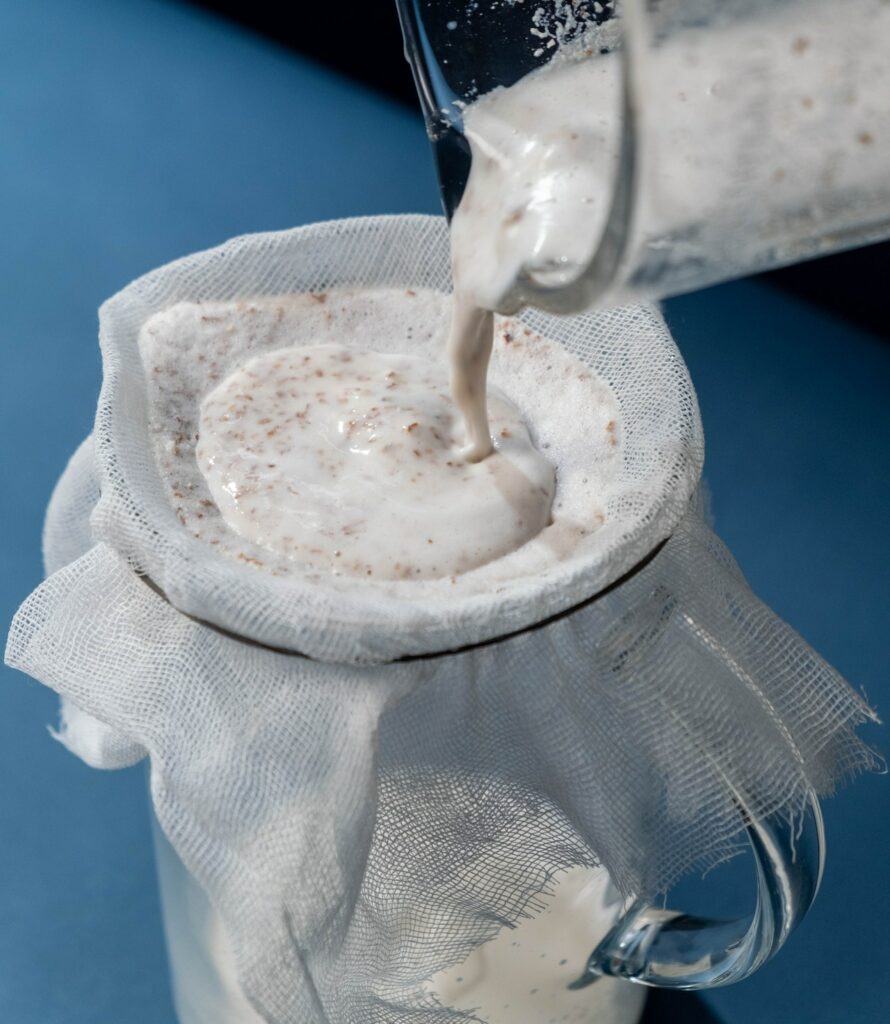Digestive complaints are very common, especially in the Western world. Our darling daughter struggled as a toddler and we switched away from cow’s milk … she improved dramatically. Dairy free milks like almond milk can alleviate some common gastrointestinal problems but can almond milk mess up your stomach? The evidence may surprise you …
Can Almond Milk Mess Up Your Stomach?
It’s extremely unlikely that almond milk will mess up your stomach. However, even though it’s dairy free, the commercial product may still mess with your digestion. In one or two rare cases this reaction can be quite extreme. But unless you have a specific almond allergy, it’s usually the additives included which make almond milk hard on the digestion.
Let’s look closer …
Watch: Dr Michael Greger on the safety concerns around the food additive carrageenan.
( NutritionFacts.org is one of our most trusted sources for up to date nutrition information )
Carrageenan Can Set Off Stomach Cramps
Carrageenan is a natural additive used in many dairy free milks. It is derived from Irish moss which is more commonly known as red seaweed.
It is used as a stabiliser and emulsifier, helping to stop the separation which is a common downside in many cow’s milk alternatives.

Carrageenan is widely used in the food industry and is not limited to the dairy free milks which have become so popular in recent times. It is found in numerous meat and dairy products too.
Since the 1960’s there have been concerns over the increased usage of this additive. It has been linked to abdominal pain, bloating and damage of the digestive system [1].
For the sake of transparency I should mention the report cited above was heavily funded by agricultural groups representing thousands of ‘family farmers’ in the US. Having said that, the text does not appear to be overly biased against dairy free alternatives.
It’s no secret that many groups have campaigned for the abolition of carrageenan altogether due to the proven carcinogenic quality of degraded carrageenan [2].
However, it is important to distinguish between the two types since the degraded version is not approved for human consumption and is not found in modern, processed foodstuffs [3].
But to complicate the picture further, there is concern among some researchers that food grade carrageenan can degrade in our stomach acids, releasing the more harmful compounds which have been shown to be carcinogenic.
Vegan friendly foods and dairy alternatives often contain this additive. Some common sources are listed below:
- Almond milk
- Oat cream
- Dairy free cheese
- Soy, hemp and rice milks
- Dairy free desserts
- Vegan pizza (to thicken the dough)
- Vegan supplements (used in the capsules)
- Vegan sweets (replacing gelatine)
To close out this section it is worth noting an often cited study [2] by Joanne K. Tobacman in which she concludes there should be a comprehensive review of carrageenan use in processed foods.
Based on animal experiments, she believes carrageenan should be excluded entirely from our food because of a possible carcinogenic effect of the undegraded version (which is approved for use in foodstuffs).
It is further worth noting the European Union banned carrageenan from infant formula milk [4].
The evidence certainly does seem to suggest that avoiding carrageenan is a good idea!
Soy Lecithin In Almond Milk May Upset Your Stomach

Here’s another emulsifier commonly used in almond milk and many other processed foods. It’s very good at binding different components of a product together.
Back in the day, when my wife and I made our own almond milk, we used soy lecithin for this exact reason. We had varying levels of success though, it has to be said!
For the majority of people this food additive is perfectly safe because it is used in such low concentrations. But there are a small number who will have an adverse reaction.
The side effects of too much soy lecithin include nausea, diarrhoea, abdominal cramps and stomach pain.
If you’re sensitive to soy lecithin you may experience some of the side effects above even with a low dose. You should see a qualified medical professional if this is the case.
There is some emerging evidence suggesting food additives like emulsifiers may be a factor in the development of gut disease. This is partly due to observed alterations in the gut microbiota [5].
However, this comprehensive study from March 2021 looked at common emulsifiers used in the food industry. Soy lecithin was one which the researchers singled out as “not having a discernible impact” on the gut microbiome [7].
It should be said there is more research needed in this specific area to establish the level of risk when consuming products like soy lecithin.
But … the current evidence does point to soy lecithin in particular being perfectly safe for human consumption. So, what else might be the problem?
Guar Gum Could Be Messing With Your Gut
Another common additive found in many commercial almond milks is a thickening agent called guar gum.
Derived from the bean of the guar plant, with the botanical name cyamopsis tetragonoloba, it has been used for centuries in South Asia.
In processed food production it is employed widely to improve the stability, thickness and texture of the product.
It is also used as a laxative so it follows that this substance could very well mess with your stomach.
Once again we discover it is not the almonds which are causing your gastrointestinal issues but the additives used to improve the product!
It is worth pointing out the quantities of guar gum used in processed food are unlikely to cause negative effects so if you’re experiencing gut problems it may be that you have a sensitivity to this substance.
A process of elimination is the way to go here. Find a product without the guar gum and see how you respond to that.
The FDA actually banned guar gum diet pills due to a number of adverse effects, mainly because the gel-like substance obstructed the oesophagus and/or the small bowel [6]. In water, guar gum can swell to 20 times its size which explains these complications.
The Answer: Throw On Your Apron!
Well ok, in fact there are two answers.
- Make your own almond milk (delicious).
- Look for additive free almond milk (also pretty nice).

The first option is well worth a try, even if you only do it once! It’s super easy with a kitchen tool like the Vitamix Total Nutrition Centre … ours is very well-used.
But if you want to step it up a gear, avoiding the nut milk bags and all that hand squeezing then a kitchen tool like the JoYoung Nut Milk Maker is for you. Fully automated nut milks (and oat milks!).
Fresh homemade almond milk tastes absolutely divine and is so good for you! We used to make it all the time and I loved it.
The downsides are it doesn’t last all that long and it does readily split in tea and coffee, which doesn’t make for a luxurious barista coffee unfortunately.
But it tastes out of this world on muesli.
… and if you have a home coffee steamer it may just stop the separation, I don’t know. If you have some experience of this please pop a comment in the box at the end of this post.
It might just make me find the time to start blending our own mylk again!
The second point above is a much easier route but a less tasty one! Many organic almond milks will contain only almonds and water. No emulsifiers or thickeners or gums!
You will, again, probably find this kind of commercial almond milk splitting in your tea and coffee. This is why manufacturers have turned to the additives.
They make the product behave more like cow’s milk rather than the ground up nuts and water which is what it actually is. The nut will always try to separate from the water.
It’s just physics!
Our delicious homemade almond milk contained 20-25% almonds which is why it was so tasty. The most luxurious commercial mylks are 5-7% and they cost a fortune!
It’s Probably Not The Almonds Messing With You

Researching this article I found it next to impossible to find reputable sources confirming negative effects of soy lecithin, apart from in large doses … but isn’t that the same with almost anything?
There does seem to be something in the carrageenan debate when it comes to the question of almond milk messing up your stomach.
The evidence is almost all anecdotal and again, peer reviewed studies are few and far between.
When push comes to shove, if I had to make a call, I’d say almond milk is unlikely to mess up your stomach unless you are sensitive to the additives used or if you have an almond or nut allergy.
Presumably if it’s the latter then you wouldn’t be buying almond milk anyway.
I hope this article has cleared up any questions you have about digestive issues with almond milk. If so, please share with those you think will benefit and if I missed anything please comment below. Sources are provided below for further reading and to verify statements made in the text.
Your opinion is always welcome and I’ll do my very best to respond to your comment in a timely manner.
Thanks for reading and have a great day!
Rohan.
This article was originally published on September 3rd, 2021 at 06:10 and updated with fresh content, a video and further sources on September 21st, 2022 at 06:13
Sources:
[1] – Carrageenan: New Studies Reinforce Link to Inflammation, Cancer and Diabetes. Updated Report by The Cornucopia Institute | April 2016. The Cornucopia Institute. https://www.cornucopia.org/wp-content/uploads/2016/04/CarageenanReport-2016.pdf [2] – Tobacman JK. Review of harmful gastrointestinal effects of carrageenan in animal experiments. Environ Health Perspect. 2001 Oct;109(10):983-94. doi: 10.1289/ehp.01109983. PMID: 11675262; PMCID: PMC1242073. https://www.ncbi.nlm.nih.gov/pmc/articles/PMC1242073/ [3] – Cohen SM, Ito N. A critical review of the toxicological effects of carrageenan and processed eucheuma seaweed on the gastrointestinal tract. Crit Rev Toxicol. 2002 Sep;32(5):413-44. doi: 10.1080/20024091064282. PMID: 12389870. https://pubmed.ncbi.nlm.nih.gov/12389870/ [4] – Wikipedia: Carrageenan. https://en.m.wikipedia.org/wiki/Carrageenan#cite_note-31 [5] – D. Partridge, K. A. Lloyd, J. M. Rhodes, A. W. Walker, A. M. Johnstone and B. J. Campbell. Food additives: Assessing the impact of exposure to permitted emulsifiers on bowel and metabolic health – introducing the FADiets study. https://www.ncbi.nlm.nih.gov/pmc/articles/PMC6899614/ [6] – Lewis JH. Esophageal and small bowel obstruction from guar gum-containing “diet pills”: analysis of 26 cases reported to the Food and Drug Administration. Am J Gastroenterol. 1992 Oct;87(10):1424-8. PMID: 1329494. https://pubmed.ncbi.nlm.nih.gov/1329494/ [7] – Naimi, S., Viennois, E., Gewirtz, A.T. et al. Direct impact of commonly used dietary emulsifiers on human gut microbiota. Microbiome 9, 66 (2021). https://doi.org/10.1186/s40168-020-00996-6

Hi, thanks for this informative article. I don’t try almond milk yet but I’m going to cause my friends says it’s delicious. I didn’t know that almond milk can mess up the stomach. I only heard that some people have an allergy to dairy. I think the problem isn’t with almonds too. I think if someone wants to know if it’s from the almond or not, try natural almond and see if it messes up your stomach or not.
Hi Liam, thank you for stopping by 🙂
My opinion is that commercial almond milk is pretty tasteless to be perfectly honest. It has its place as a convenient dairy replacement but for taste and nutrition, it has to be the homemade version.
Yes, it’s true a lot of people do have an allergy to dairy. It’s lactose intolerance. An estimated 90-100% of adults in East Asia are lactose intolerant. For African Americans it’s 75% plus.
White Northern Europeans, on the other hand, inherited a gene a few thousand years ago which now enables 95% of the population to digest lactose. It’s fascinating stuff. Although if I’m reading it correctly, this study seems to challenge the accepted wisdom, the caveat being: “beyond lactase non-persistence genetic differences”.
Anyway, for almond milk it’s usually the additives which are causing stomach issues. As you say, try the natural, homemade product if the commercial offering hurts the tummy.
It is so interesting because I know almond milk to be pretty healthy, I know that my mother-in-law drinks it and as far as I know, she has no problem with it so could it be because our bodies are different why we may have a not so good experience with a product will others may say with this product it’s smooth sailing. Just a thought but what is your take on this?
Hey Norman, thank you for taking the time to leave me a comment. I think most people will not have a problem with almond milk and for those that do, it’s the commercial product which causes issues. As mentioned in the article, it’s almost always down to the additives in there.
Carrageenan is the most likely culprit and there are some concerns with this additive. Definitely worth doing some research on that.
The best option is to make your own and with modern technology, that’s easier than ever 🙂
Hey thanks for this post!
These informational posts are a great help especially since most of my friends are vegan which means they regularly consume almond milk as an alternative to cow’s milk.
These ingredients are quite common however I never knew they can have such side effects so thanks for the info! My friends are going to be surprised upon reading this!
Hi Sariyah, thank you for your comment. I’m glad you enjoyed the post.
Nice to hear most of your friends are vegan … 🙂 I hope you will share this with them and maybe they can also comment.
The side effects noted are pretty rare to be honest but I do see some people on some forums reporting stomach issues with commercial almond milk. So it’s worth knowing what’s in there!
I love Almond Milk so much, though I have experienced one or two stomachs upset with other plant based milk, maybe Because some of these products are preserved with similar additives that are capable of reacting with our Stomach content depending on what we sink into our stomach, when, how etc.
But I chose to believe it was the additive that caused my stomach upset rather than the almond milk because I take my almond milk with various cereals, and I enjoy it real good.
Presently, my family depend strictly on homemade almond milk as it fits us best and is economical too. Thanks so much for this great educative post and keep the good work, my friend
Thank you for your comment Nathan. I’m glad you enjoyed my burblings 🙂
The home made almond milk really cannot be beaten. Creamy, nutty and so nutritious!
My only regret about giving up cow’s milk was that I didn’t do it sooner.
I have almond milk with my cereal sometimes because it messes with my stomach and I cramp a lot. Need not know about the added Carrageenan that might be playing a role in the problem. I choose to be vegan to help control my diabetes and was just taught it was diabetes medication making my stomach upset. I am going to try making my own fresh almond to see if that helps. Thank you for sharing this information and I will share your website with my family.
Hi Jannette, thanks for stopping by and leaving your thoughts.
If I understand you correctly you’re saying you only have almond milk occasionally because it gives you cramps?
I’m wondering if you also experience problems with other plant based milks? Because many of these products also have similar additives. But maybe, as you say, it’s the medication causing your stomach upset rather than the almond milk.
I do know many medications cause stomach upsets so it could well be. I hope your vegan diet is helping to control your diabetes. I have heard of many cases where a plant based diet has actually halted and reversed the condition so I’d be interested to know how you’re getting on with that.
Definitely give the home made almond milk a try. It’s awesome!
Have a great day and thanks for the share 🙂